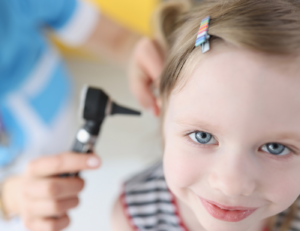ENT issues in children — when to seek medical attention

By Kathy Hubbard
Kara was a cute, funny four-year-old. I first saw her while she was sleeping under her mother’s desk at a newspaper I used to work for. Unfortunately, the poor child had a severe earache. We saw Kara a lot next year, as her ear infections neglected to come less frequently.
An article published by The Baton Rouge Clinic, a division of Mayo Clinic Care Network, says that a child’s ears, nose, and throat aren’t fully developed until they are around six.
“Until a child’s sinus drainage systems are fully developed, they’re more horizontal than vertical, so it’s easier for bacteria to get stuck and cause infections. That’s why ear infections are more common in young children than in older children or adults,” BRC said.
Kara’s mom did all the right things, according to the article. She put warm compresses on Kara’s ears and gave her over-the-counter medicines. Then, when Kara’s fever spiked, she took her to her pediatrician for antibiotics, which seemed to work, albeit briefly.
When Kara had four ear infections in less than twelve months, it was time to see a physician who specialized in ear, nose, and throat problems, an otolaryngologist. The ENT doc recommended ear tubes.
“In certain conditions, putting ear tubes in will help prevent future ear infections and the need for additional rounds of antibiotics,” Eliav Gov-Ari, MD, a pediatric ear, nose, and throat surgeon, said in an article published on the University of Missouri’s website. “We take into account a number of things, including the level of hearing, presence of fluid in the middle ear, and language development.”
The results for Kara were outstanding. Her bouts of infection subsided, and there were no long-lasting side effects of the treatment. She stopped having to sleep under a drawing table.
The BRC article continues with guidelines for other ear, nose, and throat issues. Most children get colds all year round – Dr. Gov-Ari estimates every three to four weeks – and they most often can be treated at home. But, they say that you should call your pediatrician if your child is running a fever of 101 or higher for 72 hours or if the child is sick for more than ten days.
Indications of a sinus infection can include thick yellow or green discharge. Flu symptoms will add chills, body/muscle aches, fatigue. COVID-19 symptoms will include vomiting and diarrhea, loss of taste or smell.
“Your pediatrician may refer you to an ENT if your child experiences recurring sinus infections or if minor illnesses repeatedly cause inflammation of the tonsils,” BRC said.
When my niece was six, her great uncle passed away, and I was elected to watch over her at the funeral. About halfway through the service, she fell asleep and started to snore. Inappropriately, I thought it was so funny I had to carry her out of the church before I started laughing out loud.
Well, snoring isn’t a funny matter when it comes to kids. If it happens when your child has allergies or a cold, it’s probably nothing. But, if snoring and/or noisy breathing occurs consistently, it’s time to talk to your pediatrician.
If the doc suspects enlarged tonsils, adenoids, sleep apnea, chronic sinusitis, or a deviated septum, your child will most likely be referred to the otolaryngologist.
“Certain conditions, such as sleep apnea, can lead to a variety of health issues, including malformation of facial bones, behavior issues, and even bed-wetting,” Dr. Gov-Ari said.
Now let’s take a look at nosebleeds. “Dry air, especially indoor air in the wintertime, can cause nosebleeds,” BRC said. “Children are also known to scratch and pick at their noses, which can cause excessive irritation inside the nasal passages, leading to nosebleeds.”
If the child has a minor trauma, like being hit in the nose with a toy, or if they have a cold or allergies and the nosebleed subsides quickly, you shouldn’t worry. But, if the bleeding doesn’t subside, or this occurs frequently, call the pediatrician.
“Although uncommon, your pediatrician will likely refer you to an ENT to rule out potential causes of recurring nosebleeds such as a clotting disorder,” they said.
Bonner General Health’s ENT Clinic treats pediatric cases as well as adults. Call 208-265-1003 for an appointment.
Kathy Hubbard is a member of the Bonner General Health Foundation Advisory Council. She can be reached at [email protected].
